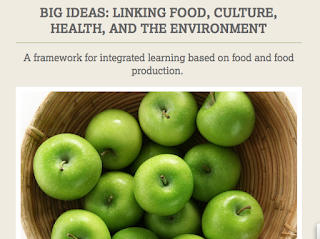I was given a tour of Odyssey Charter School in Palm Bay by Dr. R. Harrison in September 2015. Here are some highlights.
Aquaculture in the front of the building
The school embraces projects -- and has a connection with agriculture.

Apps room: I saw pairs of students working with PLTW (Project Lead the Way) to design Apps, and other software using hi-tech coding and other gaming systems. The school has paired itself with Harris Technologies.
 Sometimes the easiest way to learn about a good program that involves projects is to visit a school that found a good program. Look at the PLTW website.
Sometimes the easiest way to learn about a good program that involves projects is to visit a school that found a good program. Look at the PLTW website.
Music and Organic food in the cafeteria
Food is prepared using organic and whenever possible, locally grown produce. Students enjoy the calming of a morning breakfast while various symphonic or jazz music plays in the background.
There is currently no Youtube account for the school because "there's no real need for marketing." I hope that their best practices will soon be shown on YouTube so that my school might learn from watching how the Apps room is set up.

The school does not have an active social media section because 'We have a waiting list. It's not really a priority." Well done. Here is a link to the webpage. Look at the Nutritional Guide
Here's the text that caught my attention: I learned from these links.
Nutrition and Healthy Living Education
As a means to develop the full potential of every child, the school will offer nutrition education to all of its students. The student’s nutrition curriculum strand comes from Big Ideas: Linking Food, Culture, Health, and the Environment, written by the Center for Eco-literacy. Big Ideas offers key concepts drawn from the American Association for the Advancement of Science Benchmarks for Science Literacy. LIFE: Linking Food and the Environment is supporting curriculum published by Teachers College Columbia University. As described by LIFE curriculum, the modules increase scientific conceptual understanding in life science as well as improved attitudes toward personal health and nature. Positive behavioral changes in relation to personal and ecological health are encouraged.
 |
| See the website |
The school embraces projects -- and has a connection with agriculture.

Apps room: I saw pairs of students working with PLTW (Project Lead the Way) to design Apps, and other software using hi-tech coding and other gaming systems. The school has paired itself with Harris Technologies.
 Sometimes the easiest way to learn about a good program that involves projects is to visit a school that found a good program. Look at the PLTW website.
Sometimes the easiest way to learn about a good program that involves projects is to visit a school that found a good program. Look at the PLTW website.Music and Organic food in the cafeteria
Food is prepared using organic and whenever possible, locally grown produce. Students enjoy the calming of a morning breakfast while various symphonic or jazz music plays in the background.
 |
| A parent posted this |
The Farm at Odyssey
In front of the school, students engaged in the STEM program, collaborate with both their STEM Educator and an Organic Agricultural Specialist, in planning, designing, and building the school’s Aquaponics system. The Farm at Odyssey will eventually develop into a community program offering organic produce, and live fish (sold in buckets of water), which were born and raised in the Aquaponics system.
There is currently no Youtube account for the school because "there's no real need for marketing." I hope that their best practices will soon be shown on YouTube so that my school might learn from watching how the Apps room is set up.
 | |
| Here is the webpage |

The school does not have an active social media section because 'We have a waiting list. It's not really a priority." Well done. Here is a link to the webpage. Look at the Nutritional Guide
Here's the text that caught my attention: I learned from these links.
 | |||||||||||||||
| This school raises the bar for all who teach ... | And Dr. Harrison points out that schools in Connecticut go farther |
As a means to develop the full potential of every child, the school will offer nutrition education to all of its students. The student’s nutrition curriculum strand comes from Big Ideas: Linking Food, Culture, Health, and the Environment, written by the Center for Eco-literacy. Big Ideas offers key concepts drawn from the American Association for the Advancement of Science Benchmarks for Science Literacy. LIFE: Linking Food and the Environment is supporting curriculum published by Teachers College Columbia University. As described by LIFE curriculum, the modules increase scientific conceptual understanding in life science as well as improved attitudes toward personal health and nature. Positive behavioral changes in relation to personal and ecological health are encouraged.



No comments:
Post a Comment